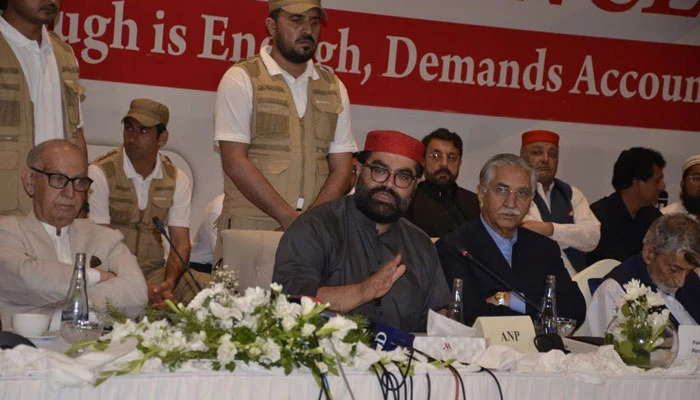ISLAMABAD: The All Parties Conference (APC) called by the Awami National Party (ANP) on Sunday ended in discord after the ruling Pakistan Muslim League-Nawaz (PML-N) and Pakistan Peoples Party (PPP) refused to sign the APC declaration, exposing deep cracks in the political landscape.
The conference, chaired by ANP President Aimal Wali Khan and joined by representatives of 19 parties, was convened to address worsening law and order, exploitation of resources, and political grievances in Khyber Pakhtunkhwa and Balochistan. But when the joint declaration was presented, both PML-N and PPP declined to endorse it, citing clauses they considered against national interest.
Senator Irfan Siddiqui, parliamentary leader of PML-N in the Senate, explained that his party and the PPP could not agree to certain demands included in the APC declaration. He said ridiculing Punjab and targeting specific provinces would not solve national issues. Instead, he stressed the need for a broad-based national dialogue rooted in the Constitution.
Siddiqui reminded participants that the Constitution belongs to every citizen, and no one will be allowed to undermine it. He added that if martial law had existed, there would not have been such freedom to openly debate in an APC held in Islamabad. He praised the Pakistan Army as defenders of the federation, saying it had defeated enemies five times larger.
Highlighting his objections, Siddiqui said all political parties must reaffirm their commitment to the Constitution and democracy. He condemned sectarian killings in Balochistan, clarifying that such acts were not committed by ordinary Baloch people. He noted that both houses of parliament represent the federation and no law can be passed for any province without their approval.
PPP’s Nayyar Hussain Bukhari also defended his party’s refusal to sign the APC declaration. He stressed that dialogue must remain within the framework of the 1973 Constitution. He reminded participants that when no party had a majority after elections, it was the PPP that stepped forward to safeguard democracy and ensure continuity of parliament.
Bukhari dismissed the idea of a “new social contract,” calling it a deviation from the national consensus document. He said Pakistan cannot afford talks with groups acting as proxies of India or carrying out terrorism in the country. He made clear that dialogue is welcome, but it must not cross constitutional boundaries.
Fazlur Rehman Sets the Tone
Earlier, JUI-F chief Maulana Fazlur Rehman opened the session with strong criticism, alleging that armed groups in tribal districts were siphoning off 10% of government funds. He said this left local businesses vulnerable to extortion. Fazl argued that natural resources of KP and Balochistan belong to their people and that multinational companies must ensure jobs and profits reach local communities.
He also rejected the revival of jirgas in the merged districts, almost ten years after the FATA merger, and accused institutions of failing to honour promises made to the tribes. Warning that Pakistan’s political system was losing credibility, he said stealing the public mandate would never be accepted.
On security, he declared that the National Action Plan had no legal authority, calling instead for a “National Economic Plan” to assure citizens that resources would directly benefit them. Fazl also urged fair treatment of Afghan refugees, noting many had studied in Pakistani universities and should not be expelled without distinction.
Other Reactions
ANP chief Aimal Wali Khan lamented the suffering of displaced families in Waziristan and the neglect of KP’s resources. Qaumi Watan Party’s Aftab Ahmad Khan Sherpao cautioned against bypassing parliament through direct talks with the establishment. Mohsin Dawar stirred controversy by demanding a new Constitution based on equality.
Bukhari firmly rejected Dawar’s call, insisting that the 1973 Constitution — which took 25 years to draft — remains the national consensus and must remain the basis for any reform.
Adopted Declaration
Despite the absence of ruling party signatures, the APC declaration adopted by other parties demanded full implementation of the 18th Amendment, an end to military operations in KP and Balochistan, and restoration of provinces’ rights over resources. It called for a judicial truth commission, cancellation of illegal land allotments, restructuring of Levies in Balochistan, and an end to enforced disappearances.
The declaration also demanded protection of tribal rights, lifting curbs on media, repealing laws such as 3-MPO and Fourth Schedule, return of displaced persons, and job creation. It opposed the forced repatriation of Afghan refugees and urged revival of Balochistan’s only agricultural university.
The APC also expressed sorrow over recent floods in KP and postponed its planned “Islamabad Peace March,” earlier scheduled for August 23, until a new date is agreed.
The conference concluded with opposition parties reaffirming that Pakistan’s stability and development depend on the supremacy of the Constitution and equal provincial rights. However, the refusal of PML-N and PPP to sign the APC declaration made clear that national interest and constitutional boundaries remain non-negotiable for the ruling alliance.

